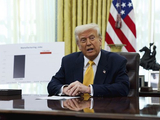Diplomatic Shifts in Palestine Recognition; Massive Nvidia Investment in OpenAI; New START Treaty Extension; China's Network Security Innovations; AI's Role in Global Trade
Recognition of Palestine: A Diplomatic Shift and Its Global Implications
Recent events show a significant diplomatic shift as several nations officially recognize Palestine as a sovereign state. The World Journal highlights French President Macron's announcement at the United Nations, formally recognizing Palestine, which elicited applause from over 140 representatives. This move is expected to provoke reactions from Israel and the United States, with Israel possibly considering annexation of parts of the West Bank in retaliation.
The Tencent article delves into the implications of this recognition, questioning its tangible effects given Palestine's lack of defined borders and a recognized government. While the recognition is a moral and political statement, it may not significantly alter the ground realities in the region.
Meanwhile, United Daily News criticizes Canada's foreign policy for its double standards, as it recognizes Palestine but remains silent on Taiwan’s exclusion from international organizations like ICAO. This underscores the complexities and contradictions in international diplomacy.
The CCTV coverage focuses on the broader international support for Palestine, noting that countries like the UK, Canada, and Australia have joined France in this recognition. The emphasis is on the collective diplomatic effort to support a two-state solution.
Sina reports on France's plan to establish an embassy in Palestine, contingent on peace agreements and the release of hostages, highlighting the conditions tied to diplomatic actions.
These developments indicate a growing international consensus towards recognizing Palestine, although the practical impact remains limited by geopolitical realities. The narratives vary, with some outlets focusing on the symbolic nature of the recognition, while others critique the inconsistencies in global diplomacy. The news highlights the ongoing challenges in achieving peace and stability in the region, with the U.S. remaining isolated in its stance against recognition.
Massive Investments in OpenAI: Strategic Alliances and Global Implications
Recent developments highlight a significant investment by Nvidia in OpenAI, with a commitment of $1,000 billion to support the construction of AI data centers in the U.S., amounting to at least 10 gigawatts of computing power. This strategic collaboration between Nvidia and OpenAI aims to build a new generation of AI models, leveraging Nvidia's vast GPU resources. The Sina article emphasizes the scale and ambition of this partnership, suggesting that computing power forms the bedrock of future economic development.
In contrast, the United Daily News provides a more cautious narrative, referring to potential risks and the broader geopolitical context. The article notes the potential for backlash and regulatory scrutiny, especially considering the scale of investment and its impact on global AI leadership.
Meanwhile, Tencent briefly mentions the investment without delving into the specifics, focusing instead on the broader context of technological advancements and corporate strategies in AI.
These developments indicate a significant shift in how major tech companies are positioning themselves within the AI landscape. Nvidia's investment in OpenAI is not only a testament to the growing importance of AI but also reflects the strategic realignments in the tech industry to secure a competitive edge in AI infrastructure and capabilities.
The Extension of the New START Treaty: A Diplomatic Dance
Recent developments highlight Russia's proposal to extend the New START Treaty for an additional year after its expiration in 2026, which the White House responded to as "not sounding bad." The proposal was discussed by Russian President Vladimir Putin at a meeting of the Russian Security Council, where he expressed confidence in Russia's deterrence capabilities but showed no intention of engaging in an arms race. Putin suggested that the U.S. maintain the current status of the treaty, emphasizing that if President Biden agrees, Russia is willing to continue adhering to the treaty's limitations on weapon numbers for a year after its expiration. (Source)
The news underscores the significant role the New START Treaty has played in maintaining nuclear balance over the years. Putin stressed that abandoning it entirely would be a "mistake and shortsighted action." He reiterated that Russia's stance is to uphold the treaty's established status after its expiration to prevent further strategic arms competition. This sentiment reflects Russia's confidence in its existing deterrence capabilities and its lack of interest in escalating military tensions. The treaty, initially signed in 2010, aimed to limit the number of nuclear warheads and delivery systems deployed by both countries and was extended in 2021 to last until 2026. (Source)
These developments indicate a careful diplomatic maneuver by Russia to maintain arms control while signaling its strategic intentions clearly. The dual pieces from CCTV News provide a consistent narrative that highlights Russia's diplomatic overtures and a call for stability, reflecting a common theme of advocating for continued arms control.
Navigating the Network Security Landscape: Innovations and Challenges
Recent events show China's commitment to strengthening its network security infrastructure with a focus on emerging technologies. An article from Xinhua highlights the country's efforts to enhance key information infrastructure protection and network data security management. The integration of AI, quantum communication, and 6G technologies is reshaping the logic and boundaries of network security, indicating a strategic shift from reactive to proactive defense. The news highlights that China's network security sector is expected to grow significantly, with a projected market size increase from $112 billion in 2024 to $178 billion by 2029, according to IDC.
These developments indicate a robust push towards digital transformation in manufacturing and other sectors, as noted by Yao Xiangzhen from the China Electronics Technology Standardization Institute. The focus on digital and intelligent transformation aims to foster a high-quality and sustainable industry growth phase. The news underscores the importance of international collaboration and standard-setting to enhance China's global standing in network security, as advocated by Li Xuelin, chairman of Tianrongxin Technology Group.
In contrast, another Xinhua article takes a different angle, emphasizing the risks associated with network security breaches. It appears that the narrative shifts to caution against the misuse of technology for criminal activities. The article outlines how individuals, often young and tech-savvy, exploit vulnerabilities for illegal gains, such as hacking into systems to plant malicious links. This piece serves as a warning about the growing trend of cybercrime among younger demographics, with 78% of cybercrime suspects being under 40.
The news highlights the societal impact of these crimes, detailing cases like that of Liu Moumou, who hacked into a gaming company's server causing significant financial damage. The article stresses the importance of legal awareness and ethical use of technology, urging individuals to protect network security rather than compromise it. This narrative aims to educate and deter potential offenders by illustrating the legal and social consequences of cybercrime.
The Role of AI in Transforming Global Trade and Central Enterprises
Recent events show the transformative potential of artificial intelligence (AI) in global trade, as reported by Xinhua. The World Trade Organization's 2025 report predicts that with the right policy support, AI could boost global trade by nearly 40% by 2040, highlighting its potential to reshape international commerce. AI technologies promise to reduce trade costs significantly by streamlining traditional processes such as contract signing and logistics.
These developments indicate that AI is becoming a crucial force in driving sustainable growth and transformation in global trade. The report emphasizes AI's role in optimizing supply chains and reducing logistics costs by 20% to 30%, which could reshape the global value chain and enhance the participation of developing countries in international trade.
The news highlights the challenges faced by developing nations, particularly in bridging the digital divide and enhancing infrastructure. To fully leverage AI's potential, international cooperation is deemed essential to enhance digital infrastructure and support developing countries.
Meanwhile, another article from Xinhua focuses on the efforts of central enterprises in China to integrate AI across various industries. It appears that these enterprises are moving from pilot projects to large-scale applications, with significant advancements in computing, data, and model capabilities.
However, the article also points out the existing constraints in scaling AI applications, such as the need for long-term planning and the integration of AI technologies with core production processes. The challenges include technical integration, deployment costs, and the need for high-quality data and skilled personnel.
In summary, while both articles from Xinhua present AI as a transformative force, the first emphasizes its global trade implications, and the second focuses on domestic challenges and advancements within China's central enterprises. The different angles reflect a dual narrative: one of optimism for global trade and another of cautious progress within China's industrial landscape.
No Articles to Summarize
There are no articles provided for summarization or analysis. Please provide a list of articles related to a common topic or theme for a comprehensive summary and analysis.



